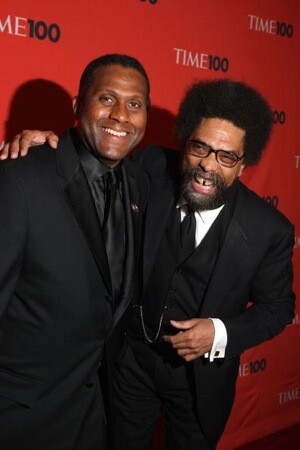The Perils of Poverty Talk

The most surprising and interesting moment of the Tavis Smiley/Cornel West traveling colloquy on poor folk in America known as the Poverty Tour, which pulled into L.A. this past Sunday at the Wilshire Boulevard Temple, was West's reaction to an audience member who accused him and Smiley of being latter-day "poverty pimps."
West is known as much for his principled embrace of all people, including his opposition that he sincerely addresses as "brothers and sisters," as he is for his sharp intellect and staunchly progressive politics. But with that single accusation, one of the first comments made during the open-mic portion of the afternoon, he leapt to his feet in clear fury, moved to the edge of the stage while shouting his protests (difficult to hear over the roar of the crowd that erupted) and looking like he was more than ready for fisticuffs.
Smiley looked startled but remained composed, stepping in to referee by breaking down the sentiment via a Socratic method of questioning and deconstructing. Things settled down and the Q & A went on more or less uneventfully. But the electricity of that confrontation and the volatility of not just the issue of poverty but of Smiley & West's propriety in talking about it, was almost palpable the rest of the event.
This was a good thing. The healthy tension in this whole multi-city Poverty Tour, at least in black circles, was been building for a while now. The tension is between the desperate need for some high profile black figures to hold up poverty and joblessness as serious issues that must be politically addressed and redressed, especially in black communities; and the ongoing resentment of Smiley and West as black Obama-haters who are giving our embattled first black president more grief that he doesn't need.
On Sunday, the pair didn't focus on Obama nearly as much as they did on the lack of courage on the part of the entire American political class, Democratic and Republican. Neither party can seem to bring itself to talk about any group less fortunate than the middle class, a group that is rapidly sliding into the working class and the dreaded poor class below that. I always thought that being poor and being broke were two different things--broke means you're educated or skilled and only temporarily out of work, poor is a condition that tends to be generational and feel permanent. In this recession/depression, those distinctions are breaking down, nowhere faster than in black communities where middle-classness was always more tenuous than we let ourselves believe.
Smiley and West did not directly address the plight of black folks, for the most part, which frustrated some in the audience a bit--after all, the lack of a black focus is just what they've complained Obama doesn't have. But their righteous anger about the overall lack of attention being paid to the poor was heartening; it reminded the very receptive audience that what the left has been missing so badly--including the black left--is moral indignation about the causes of equality and access that it claims to represent. Sunday was a sermon as much as it was a town hall, but that's alright: spirituality was certainly in order. And that moment of bring-it-on anger from the normally circumspect West reminded us that sometimes a fight must be had.
Journalist and op-ed columnist Erin Aubry Kaplan's first-person accounts of politics and identity in Los Angeles, with an eye towards the city's African American community, appear every Thursday on KCET's SoCal Focus blog.


